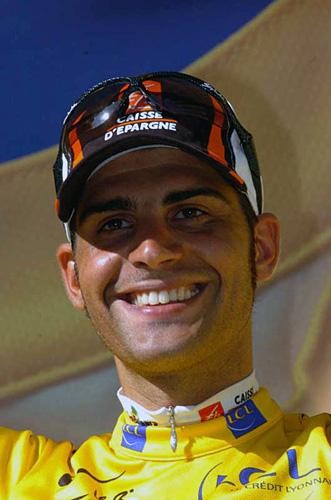Pereiro threatened with exclusion from Tour
By Susan Westemeyer, Laura Weislo and Antonio J. Salmerón The French newspaper Le Monde has reported...


French antidoping agency wants medical justification for asthma drug
By Susan Westemeyer, Laura Weislo and Antonio J. Salmerón
The French newspaper Le Monde has reported that 2006 Tour de France runner-up Oscar Pereiro tested positive twice for the asthma drug salbutamol. The rider's urine tested positive for the drug after stage 14 and again after stage 16. Poised to take the title of Tour winner ever since Floyd Landis' positive control for testosterone, Pereiro might instead find himself banned from the race because of a dispute between the UCI and the French antidoping agency over what the agency views as excessive medical exemptions.
The UCI had apparently granted Pereiro, along with dozens of other riders, 'therapeutic use exemptions' (TUE's) for drugs that are normally banned in competition unless the athletes can show a medical need for the substance. However, the French antidoping agency AFLD was not satisfied with Pereiro's documentation for his exemption for the asthma drug, and were suspicious of the large number of riders being granted exemptions.
UCI President McQuaid said he knew nothing of the case and would not comment on the specifics. However, he told the Associated Press that "there have always been differences of opinion" between the UCI and the French agency on the medical waivers. The UCI uses the WADA guidelines, "and the French agency has a different view of this."
The AFLD requested further documentation to demonstrate a true medical justification for the TUE from both Pereiro and the UCI, but the requests went unfulfilled. The agency threatened to ban the rider from competition on French soil unless he provides adequate justification for use of the asthma drug. The AFLD plans to meet next Thursday to review the case and open proceedings against Pereiro if he does not fulfill their requests.
Meanwhile, Pereiro's Caisse d'Epargne team played down the story. "Oscar received two letters from the AFLD in October and November," said Francis Lafargue, the team's spokesman, according to AFP wire reports, "He had the documents but he forgot to respond to the agency, it is carelessness." The team promised to deliver the documentation to the AFLD by the end of the week.
Get The Leadout Newsletter
The latest race content, interviews, features, reviews and expert buying guides, direct to your inbox!
Rafael Blanco, the director of the Spanish Sport Superior Council, defended Pereiro to the Spanish press agency EFE. “Neither the National [Cycling] Federation nor the National Antidoping Commission have received any notification on the matter”, insisted Blanco, adding, “and given the time passed (since July), if there had been some incidence, they must have given notice to these two organizations”.
Blanco explained that, "salbutamol is a substance that can be used in the sport with a medical prescription and for therapeutic reasons, and if Pereiro had this, that is perfectly legal”. Blanco insisted that the process to obtain a medical authorization is rigorous and demands a series of previous tests.
In September, AFLD president Pierre Bordry had released information that 12 doping controls from the 2006 Tour de France were positive, but all the riders had TUEs for the detected substance. Pereiro is the first rider to be named in these cases, but the Le Monde report says that six other cases of "doubtful" medical waivers will also be looked into.
Pereiro isn't the first high profile cyclist to run into trouble with the French agency over the drug. The case almost identically echoes one of another Spanish cyclist, Igor Gonzalez de Galdeano, who tested positive for salbutamol during the 2002 Tour de France. Gonzalez de Galdeano was allowed to continue racing but was ultimately banned by the French antidoping agency, then called the CPLD, from competing in France for six months, which would have excluded him from the 2003 Tour had a broken collarbone not done the same.
The prevalence of asthma in the professional peloton has been the subject of debate for more than a decade. One study before the 1996 Olympics showed that 45% of cyclists had asthma that required medication. While other forms of corticosteroids offer some performance enhancing benefit, inhaled versions such as those found in asthma drugs, and beta-agonists like salbutamol, are not considered to be performance enhancing, and are allowed in competition with a TUE.